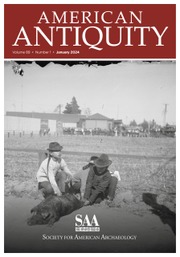Article contents
Some Artifact Sites of Early Man in the Great Plains and Adjacent Areas
Published online by Cambridge University Press: 25 January 2017
Extract
During the past fourteen collecting seasons, paleontological expeditions of the University of Nebraska State Museum have excavated a large number of sites which contained the bones of extinct mammals associated with the artifacts of Early Man. Many of these sites have been reported but some data have not been published. All of the studies of Early Man have been carried on from a paleontologic and stratigraphic point of view. It is hoped that a faunal and stratigraphic sequence connecting the Pleistocene and Recent will eventually be established, and that Early Man's relation to this sequence will be determined. It is the purpose of this brief paper to summarize the work relating to Early Man which has been done by the field parties of the University of Nebraska State Museum since 1937. The explorations have been confined chiefly to Nebraska, New Mexico, Texas, and Wyoming. Since the studies of the Nebraska sites have, for the most part, been published, the discussion will be confined to the sites in the latter three states.
- Type
- Research Article
- Information
- Copyright
- Copyright © The Society for American Archaeology 1943
References
1 Barbour and Schultz, 1932a; 1932b; 1936a; 1936b; 1937; 1941; MacClintock, Barbour, Schultz, and Lugn, 1936; Meserve and Barbour, 1932; Schultz, 1932, 1937, 1938, 1940; Schultz and Eiseley, 1935, 1936; etc. See Bibliography, pp. 291–295, following.
2 During 1940 and 1941 the Nebraska Museum also had field parties exploring and working in caves in north central Arkansas in the Ozark Mountains but no evidence of Early Man has been encountered. Much Pleistocene fauna, however, has been excavated.
3 See footnote 1.
4 Howard, 1931; 1932; 1935a; 1935b; 1935c.
5 Howard, 1932; 1935a; Schultz and Howard, 1935.
6 Schultz and Howard, 1935.
7 Howard, 1935a; 1935b; 1935c; Cotter, 1937.
8 Ayer, 1936.
9 Schultz, 1940, pp. 35–36; Sellards, 1940, p. 403; Barbour and Schultz, 1941, pp. 67–68. Locality: sixteen miles north of Canadian, near Lipscomb, in Lipscomb County, Texas; on the farm of Mr. Commadore Hopper, on north side of Sand Creek, a branch of Wolf Creek, which is tributary to the North Canadian River.
10 Roberts, 1935; 1936; 1938.
11 Cook, 1927; Figgins, 1927.
12 Roberts, 1935, Pl. 13.
13 Barbour and Schultz, 1932; Schultz and Eiseley, 1935; 1936.
14 Barbour and Schultz, 1932b.
15 Barbour and Schultz. 1932b, Fig. 169. D: Schultz and Eiseley, 1935, Pl. 8, D.
16 Howard, 1941.
17 Several new Yuma localities were encountered in Sweetwater County, Wyoming, during August, 1942, by a Nebraska field party. One camp site already has yielded over 200 Yuma type dart points in association with hearths and fossilized bones. Work at these new sites has been discontinued until after the war.
- 12
- Cited by


